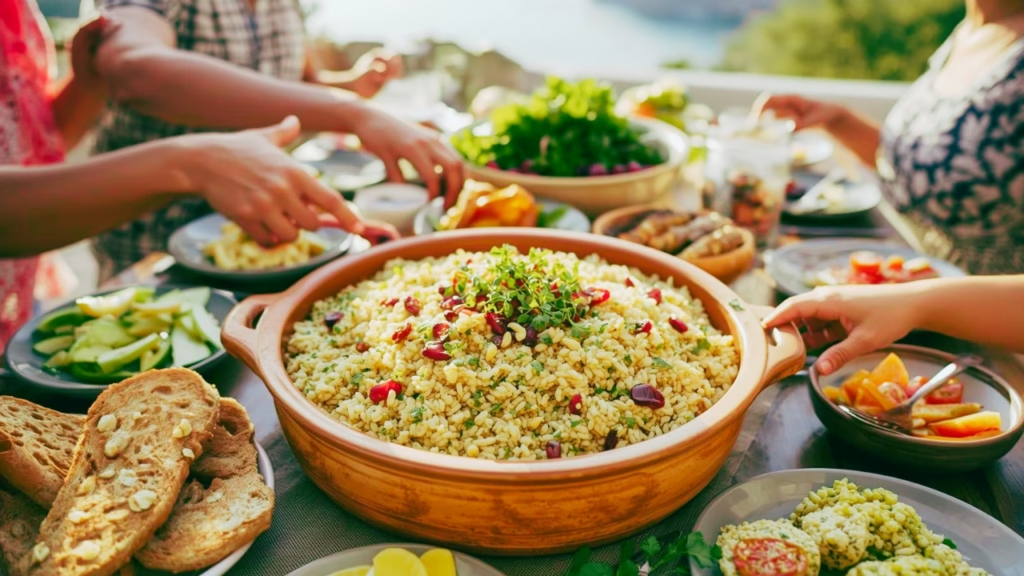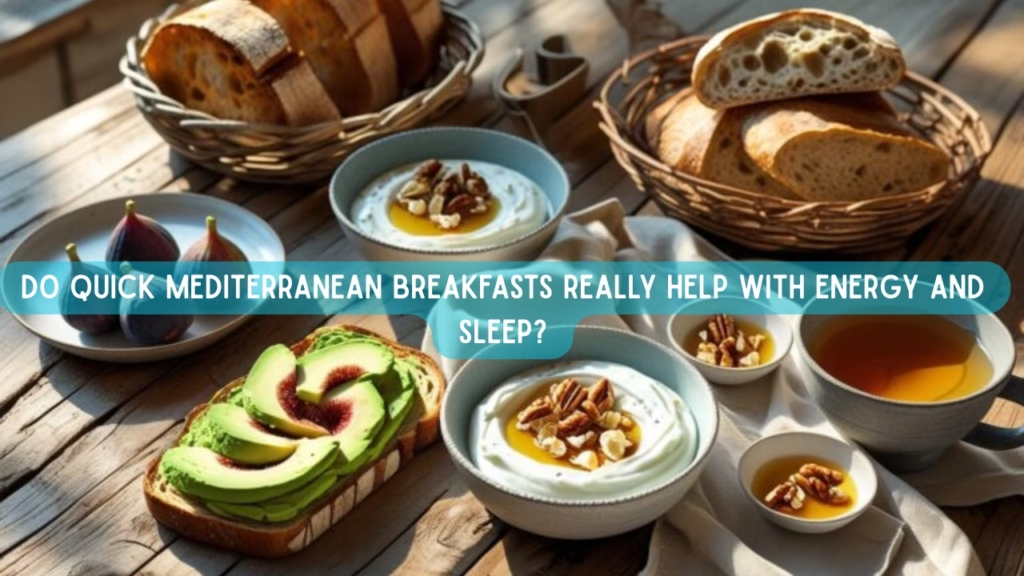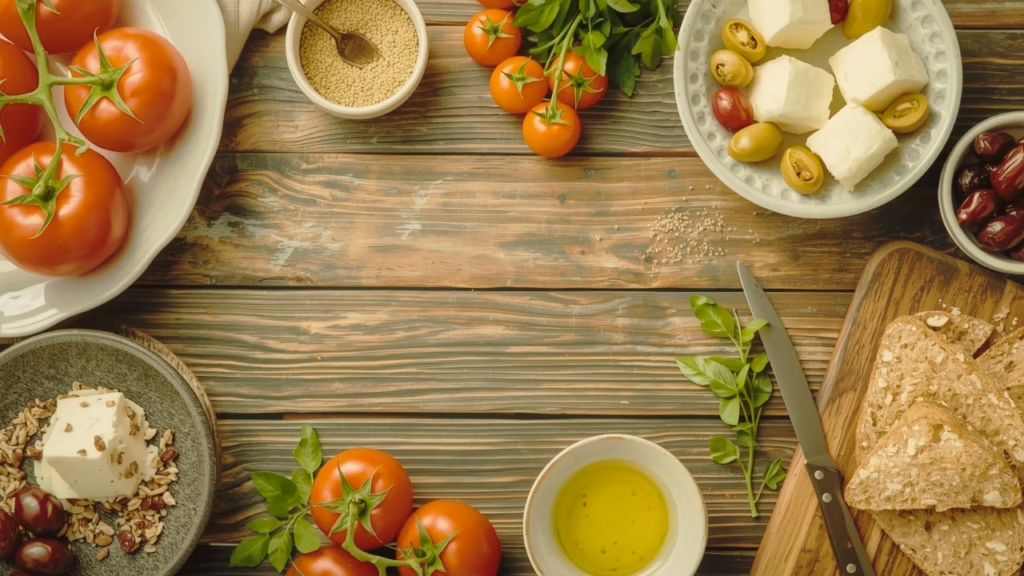Mediterranean Diet Whole Grains: The Complete Guide to Heart Health and Longevity
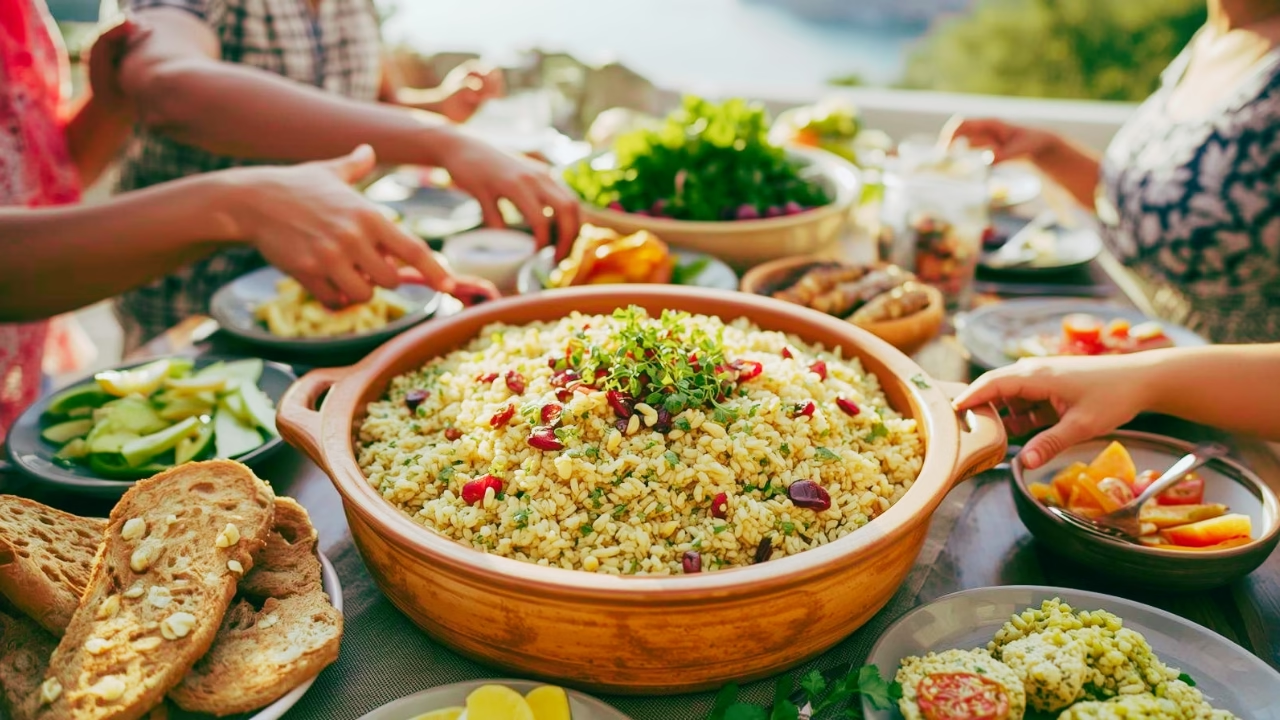
Mediterranean diet whole grains form the foundational layer of one of the world’s healthiest eating patterns, providing essential nutrients that protect your heart, extend your lifespan, and deliver sustained energy throughout your day. Unlike refined grains that have been stripped of their nutritional power, whole grains retain all three parts of the kernel—the fiber-rich bran, the nutrient-dense germ, and the energy-providing endosperm—creating a complete package of vitamins, minerals, antioxidants, and health-promoting compounds that work synergistically to support optimal wellness.
The science behind Mediterranean diet whole grains is compelling and consistent. Research demonstrates that people who regularly consume whole grains as part of a Mediterranean eating pattern experience significantly lower rates of cardiovascular disease, type 2 diabetes, certain cancers, and premature death compared to those who favor refined grains. These aren’t marginal improvements—we’re talking about real, measurable differences that can add years to your life while dramatically improving the quality of those years.
Understanding What Makes Mediterranean Diet Whole Grains Special
Mediterranean diet whole grains encompass a diverse array of ancient and traditional grains that have sustained populations around the Mediterranean Sea for millennia. These aren’t the bland, cardboard-like whole grains that might come to mind if your only experience has been disappointing whole wheat bread. Instead, Mediterranean whole grains offer rich, nutty flavors, satisfying textures, and remarkable culinary versatility that makes eating healthy feel like a pleasure rather than a sacrifice.
Traditional Mediterranean whole grains include barley, bulgur, farro, freekeh, whole wheat, brown rice, oats, spelt, millet, and rye. Each brings its own unique flavor profile and nutritional characteristics to the table. Farro delivers a chewy texture and subtle nuttiness that pairs beautifully with roasted vegetables. Bulgur cooks quickly and forms the foundation of traditional tabbouleh. Barley’s creamy texture when cooked makes it perfect for soups and risotto-style dishes. These grains aren’t interchangeable—each has distinct qualities that shine in different preparations.
What distinguishes Mediterranean whole grains from the refined grains that dominate Western diets is what remains intact. When grain is refined, millers remove the bran and germ, leaving only the starchy endosperm. This process strips away most of the grain’s fiber, B vitamins, vitamin E, healthy fats, minerals like iron and magnesium, and thousands of phytonutrients that protect against disease. While manufacturers often enrich refined grains by adding back some vitamins, this enrichment cannot replicate the complex nutritional matrix found in whole grains where nutrients work together synergistically.
The Mediterranean tradition of consuming whole grains isn’t a modern health fad—it reflects how people ate for thousands of years before industrial milling made refined grains economical and widely available. Until the late nineteenth century, Mediterranean populations consumed grains in their whole form simply because removing the bran and germ was too labor-intensive and expensive. Ironically, what was once an economic necessity has become a nutritional advantage we’re now working to reclaim in our modern diet.
The Powerful Health Benefits of Mediterranean Diet Whole Grains
Mediterranean diet whole grains deliver an impressive spectrum of health benefits that extend far beyond basic nutrition. The most well-documented benefit involves cardiovascular health, where whole grains demonstrate remarkable protective effects. Studies consistently show that people who consume more whole grains experience lower risks of heart disease and stroke. The mechanisms behind this protection are multifaceted—whole grains help reduce LDL cholesterol, lower blood pressure, decrease inflammation, and improve blood vessel function.
One landmark analysis found that each daily serving of whole grains reduces overall mortality by nine percent, cardiovascular disease mortality by fourteen percent, and cancer mortality by three percent. These aren’t theoretical benefits that might materialize if you eat whole grains perfectly for decades. These are real-world outcomes observed in actual populations who simply made whole grains a regular part of their eating patterns. The dose-response relationship is clear: the more whole grains you consume, the greater the protective benefits, up to about three to five servings daily where the benefits plateau.
Blood sugar regulation represents another critical benefit of Mediterranean diet whole grains. The fiber content in whole grains slows the digestion and absorption of carbohydrates, preventing the blood sugar spikes and crashes associated with refined grains. This steady energy release matters tremendously for preventing and managing type 2 diabetes. Research indicates that replacing refined grains with whole grains can reduce diabetes risk by approximately fifty percent—a reduction comparable to what many diabetes medications achieve, but without side effects or costs.
The impact on weight management deserves attention as well, particularly because many people mistakenly believe that grains, even whole grains, contribute to weight gain. The opposite appears true. Whole grains’ high fiber content promotes satiety, helping you feel full and satisfied with fewer calories. Studies comparing people who eat predominantly whole grains versus refined grains consistently find that whole grain consumers maintain healthier body weights and are less likely to gain excessive weight over time. The fiber also supports digestive health by feeding beneficial gut bacteria and promoting regular bowel movements.
Emerging research reveals that Mediterranean diet whole grains may protect cognitive function and reduce dementia risk. The mechanisms likely involve multiple pathways—improved cardiovascular health ensures better blood flow to the brain, reduced inflammation protects brain tissue from damage, and steady blood sugar levels prevent the metabolic dysfunction associated with cognitive decline. B vitamins abundant in whole grains, particularly folate and several others, play direct roles in brain health and neurotransmitter production.
Exploring Traditional Mediterranean Whole Grains
Mediterranean diet whole grains offer remarkable variety, each bringing unique characteristics that expand your culinary repertoire while delivering health benefits. Bulgur wheat stands out for its convenience and versatility. This parboiled, cracked wheat cooks in just minutes, making it perfect for busy weeknights. Its slightly chewy texture and mild, nutty flavor make it the foundation of traditional Middle Eastern dishes like tabbouleh and kibbeh. A cup of cooked bulgur provides six grams of fiber and six grams of protein, making it remarkably nutrient-dense.
Farro, an ancient wheat variety beloved in Italian cuisine, delivers exceptional flavor and nutrition. Its firm, chewy texture holds up beautifully in soups, salads, and grain bowls. Farro contains more protein than modern wheat varieties, along with substantial amounts of magnesium, zinc, and B vitamins. When cooked properly, farro develops a satisfying bite that adds textural interest to any dish. You can find three types—farro piccolo (einkorn), farro medio (emmer), and farro grande (spelt)—each with slightly different cooking times and textures.
Barley deserves rediscovery beyond its traditional role in soups. This versatile grain becomes wonderfully creamy when cooked slowly, making it perfect for risotto-style preparations. Barley contains high levels of beta-glucan, a type of soluble fiber that specifically reduces cholesterol levels. Even pearled barley, which has had some of the outer bran removed, retains significant fiber and nutritional value. Its mild, slightly sweet flavor pairs well with both savory and sweet preparations, from mushroom barley pilaf to breakfast porridges with fruit and nuts.
Freekeh represents one of the most interesting Mediterranean whole grains. Made from young green wheat that’s been roasted and cracked, freekeh delivers a distinctive smoky, nutty flavor unlike any other grain. It’s particularly high in protein and fiber, with a low glycemic index that makes it excellent for blood sugar management. Freekeh’s robust flavor stands up well to bold seasonings and works beautifully in grain salads, pilafs, and as a bed for grilled meats or vegetables.
Whole wheat, the grain most familiar to Western audiences, appears throughout Mediterranean cuisine in forms ranging from whole wheat bread to pasta to couscous. Traditional Mediterranean populations consumed whole wheat in minimally processed forms—coarse whole wheat bread, whole wheat pasta, and whole wheat couscous. The key is choosing products that actually contain whole wheat, not just brown-colored refined flour. Look for “whole wheat” or “whole grain wheat” as the first ingredient and check that products provide at least three grams of fiber per serving.
How to Incorporate Mediterranean Diet Whole Grains Daily
Mediterranean diet whole grains become a natural part of your eating pattern when you understand simple incorporation strategies that don’t require complicated recipes or extensive meal prep. Start your morning with whole grain options that provide sustained energy without the mid-morning crash associated with refined grain breakfasts. Steel-cut oats cooked with cinnamon and topped with nuts and fresh fruit create a satisfying Mediterranean-style breakfast. Whole grain toast drizzled with olive oil and topped with tomatoes and feta offers a savory alternative that aligns perfectly with Mediterranean principles.
Transform your lunch routine by swapping refined grains for whole grain alternatives. Replace white rice with bulgur or farro in grain bowls. Choose whole wheat pita for sandwiches instead of white bread. Pack tabbouleh made with bulgur, fresh herbs, tomatoes, and lemon juice as a refreshing, fiber-rich lunch that keeps you satisfied all afternoon. When eating pasta, opt for whole wheat varieties—modern whole wheat pastas have improved dramatically from the grainy, unpleasant versions of years past. Al dente cooking gives whole wheat pasta an appealing texture that works well with traditional Mediterranean sauces.
Dinner provides the perfect opportunity to showcase Mediterranean whole grains in hearty, satisfying dishes. Use farro or barley as a base for grain bowls topped with roasted vegetables, grilled fish or chicken, and a drizzle of olive oil and lemon. Prepare whole grain pilafs seasoned with herbs, garlic, and onions as side dishes that add substance and nutrition to any meal. Whole wheat couscous steams in minutes and provides a quick accompaniment to stews and tagines. Even simple substitutions—brown rice instead of white, whole grain bread instead of refined—accumulate into significant nutritional improvements over time.
Batch cooking makes incorporating Mediterranean diet whole grains practical for busy schedules. Dedicate an hour on the weekend to preparing large batches of your favorite whole grains. Most whole grains store well in the refrigerator for up to five days or can be frozen for several months. Having cooked grains ready means you can assemble quick meals throughout the week—add cooked farro to soups, toss bulgur into salads, reheat barley as a side dish, or use brown rice as a base for stir-fries. This preparation strategy removes the time barrier that often prevents people from choosing whole grains over quick-cooking refined options.
Cooking Techniques for Perfect Mediterranean Whole Grains
Mediterranean diet whole grains achieve their best flavor and texture when cooked properly, and fortunately, the techniques are straightforward once you understand a few key principles. The most important factor is the water-to-grain ratio, which varies by grain type. Most whole grains cook best with a ratio of approximately two to three cups of water per cup of grain, though some, like bulgur, require less liquid while others, like barley, benefit from more. Using broth instead of water adds depth of flavor without extra effort.
Toasting grains before cooking intensifies their nutty flavor and adds aromatic complexity to the finished dish. Heat a dry skillet over medium heat, add your grains, and toast them for three to five minutes, stirring frequently, until they smell fragrant and have darkened slightly. This simple step transforms grains from bland to flavorful. After toasting, add your cooking liquid, bring to a boil, then reduce heat and simmer until the grains are tender. Most whole grains take thirty to forty-five minutes to cook through, though cooking times vary.
The pilaf method produces particularly flavorful results for Mediterranean whole grains. Start by sautéing aromatics like onions and garlic in olive oil until softened. Add your grains and toast them briefly in the oil, coating each kernel. Pour in hot broth, add herbs and seasonings, bring to a boil, then cover and reduce to a gentle simmer. This technique infuses the grains with flavor from the inside out as they absorb the seasoned cooking liquid. When the grains are tender and the liquid is absorbed, remove from heat and let stand covered for five minutes before fluffing with a fork.
For grains that will be used in salads or grain bowls, cooking them like pasta in abundant boiling water produces excellent results. Bring a large pot of water to a rolling boil, add salt, then add your grains. Cook until tender but still pleasantly chewy, then drain in a colander. This method prevents mushiness and works particularly well for farro, barley, and wheat berries. You can cook them slightly less than fully tender if they’ll be reheated later, as they’ll continue softening during storage and reheating.
Mediterranean Diet Whole Grains for Every Meal
Mediterranean diet whole grains adapt beautifully to every meal of the day, offering endless possibilities that keep your eating pattern varied and interesting. Breakfast becomes more satisfying and nutritious when built around whole grains. Beyond oatmeal, consider savory whole grain breakfast bowls featuring leftover farro or bulgur topped with a poached egg, sautéed greens, and a drizzle of olive oil. Whole grain toast topped Mediterranean-style with mashed avocado, tomatoes, and za’atar creates a filling breakfast that sustains energy for hours.
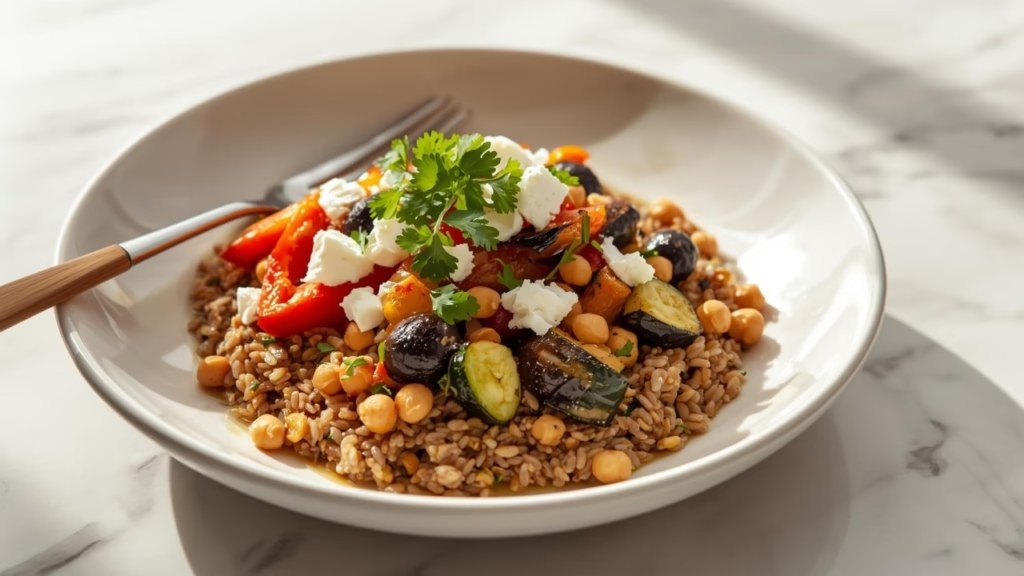
Lunch options expand dramatically when you embrace Mediterranean whole grains. Tabbouleh, the classic Lebanese salad of bulgur, fresh parsley, mint, tomatoes, and lemon juice, exemplifies how whole grains can be light yet satisfying. Grain salads combining cooked farro or barley with roasted vegetables, chickpeas, feta cheese, and a lemon-olive oil dressing pack well for work lunches and improve in flavor as they sit. Whole wheat pita stuffed with hummus, vegetables, and a whole grain like bulgur creates a complete, balanced meal in portable form.
Dinner showcases Mediterranean diet whole grains in their most diverse applications. Whole grain risotto made with barley or farro delivers comfort food satisfaction with added nutrition. The grains’ natural creaminess, enhanced by slowly adding warm broth and finishing with parmesan and olive oil, creates a luxurious dish without cream or excessive butter. Stuffed vegetables—peppers, tomatoes, or zucchini filled with a mixture of bulgur, herbs, onions, and sometimes ground meat—represent a classic Mediterranean preparation that’s both beautiful and nourishing.
Side dishes featuring whole grains complete Mediterranean meals beautifully. Simple preparations shine when quality ingredients are used properly. Cook farro and toss it with olive oil, lemon zest, fresh herbs, and toasted pine nuts for an elegant side that pairs with fish or chicken. Prepare a barley pilaf with caramelized onions and mushrooms. Steam whole wheat couscous and fluff it with preserved lemon and fresh cilantro. These straightforward sides add substance and nutrition while allowing main dishes to shine.
Overcoming Common Whole Grain Challenges
Mediterranean diet whole grains sometimes face resistance from people accustomed to refined grains, but these challenges are easily overcome with the right strategies. Texture concerns top the list—some people find whole grains too chewy or dense compared to fluffy white rice or soft white bread. The solution involves proper cooking and gradual transition. Ensure you’re cooking grains until truly tender, not underdone, which requires tasting for doneness near the end of cooking time. Start your transition by mixing whole and refined grains—half brown rice and half white rice, or blending whole wheat and white pasta—then gradually increase the proportion of whole grains as your palate adapts.
Cooking time presents another barrier, particularly for busy households where convenience matters. While most whole grains do require longer cooking than their refined counterparts, strategic approaches minimize this issue. Batch cooking eliminates the time concern—cook a week’s worth of grains at once. Many whole grains also cook beautifully in rice cookers or Instant Pots, requiring no attention beyond the initial setup. Quick-cooking whole grains like bulgur and whole wheat couscous rival refined grains for convenience. Freekeh and quick-cooking barley also prepare in fifteen to twenty minutes, making them weeknight-friendly.
Flavor preferences sometimes work against whole grains, especially for palates accustomed to the mild taste of refined grains. This actually represents an opportunity rather than a problem. Whole grains’ more pronounced flavors mean they can carry bold seasonings that would overwhelm refined grains. Don’t treat whole grains like refined grains—they aren’t bland canvases waiting for sauce. Instead, season them generously with herbs, garlic, olive oil, lemon, and spices during cooking. Toast them before cooking to intensify their natural nuttiness. View their flavor as a feature, not a bug.
Cost concerns occasionally arise, as whole grains sometimes cost more than refined versions. However, the price difference is usually modest, and whole grains’ superior satiety means you may eat smaller portions while feeling more satisfied. Buying whole grains in bulk from stores with high turnover keeps costs down while ensuring freshness. When you consider that whole grains reduce your risk of expensive chronic diseases, they represent an investment in future health that pays dividends far exceeding their modest upfront cost.
Whole Grains and the Complete Mediterranean Lifestyle
Mediterranean diet whole grains work best when integrated into the broader Mediterranean lifestyle that includes not just what you eat, but how you eat and live. The Mediterranean approach views meals as social occasions meant to be savored, not rushed through while distracted by screens or stress. When you sit down to enjoy a grain bowl or a plate of whole wheat pasta with vegetables, give it your full attention. Notice the textures, flavors, and aromas. This mindful eating naturally leads to better portion control and greater satisfaction from your meals.
Physical activity complements the nutritional benefits of Mediterranean diet whole grains. The steady energy release from whole grains supports sustained physical activity without the energy crashes associated with refined carbohydrates. Traditional Mediterranean populations built movement into daily life through walking, gardening, and manual labor rather than formal exercise programs. Find ways to move naturally throughout your day—walk to run errands, take stairs, garden, play with children or grandchildren. This daily movement, fueled by the steady energy from whole grains, supports metabolic health and healthy weight maintenance.
Social connections enhance both the enjoyment and health benefits of Mediterranean eating. Share meals featuring whole grains with family and friends. The act of cooking for others and sharing food strengthens social bonds while encouraging healthier eating patterns. People tend to eat more vegetables and whole grains when dining with others compared to eating alone. Make meal preparation a social activity too—involve family members in cooking, teaching children about different grains and how to prepare them. These experiences create positive associations with healthy eating that last a lifetime.
Sleep, stress management, and overall life satisfaction complete the Mediterranean lifestyle framework. Chronic stress and poor sleep undermine even the healthiest diet’s benefits by disrupting hormones that regulate appetite, blood sugar, and metabolism. The Mediterranean lifestyle traditionally included afternoon rest periods, adequate sleep, and time spent outdoors in nature—all practices that modern research confirms as crucial for health. While you might not be able to implement siesta culture in your workplace, you can prioritize sleep, practice stress reduction techniques, and ensure your life includes downtime and pleasure alongside productivity.
Special Considerations and Adaptations
Mediterranean diet whole grains accommodate various dietary needs and health conditions with thoughtful adaptations. For people with celiac disease or gluten sensitivity, several Mediterranean whole grains are naturally gluten-free. Brown rice, while not traditionally Mediterranean, works beautifully in Mediterranean recipes. Quinoa, though from South America, has been enthusiastically adopted in modern Mediterranean cooking and provides complete protein along with its whole grain benefits. Buckwheat, despite its name, contains no wheat and makes excellent pilafs and breakfast porridges. Millet and amaranth also offer gluten-free whole grain options that adapt well to Mediterranean preparations.
Blood sugar management requires attention to portion sizes even with whole grains, though whole grains represent a vastly better choice than refined grains for people with diabetes or prediabetes. The fiber in whole grains slows sugar absorption, preventing spikes, but the carbohydrates still affect blood sugar. Pair whole grains with plenty of vegetables, some protein, and healthy fats to further moderate blood sugar response. A grain bowl featuring a modest portion of farro topped with abundant roasted vegetables, chickpeas, and olive oil balances carbohydrates with fiber, protein, and fat for optimal blood sugar control.
Weight management goals work well with Mediterranean diet whole grains when portions remain appropriate. Whole grains are nutrient-dense but also calorie-dense—a cup of cooked grain provides about two hundred calories, which isn’t excessive but does add up if portions balloon. Use whole grains as part of your meal, not the entire meal. A fist-sized portion of cooked grains alongside generous vegetables and moderate protein creates a balanced, satisfying meal that supports healthy weight without excessive calories. The grains’ fiber ensures you feel full and satisfied, reducing the temptation to overeat or snack between meals.
Athletes and very active individuals can consume larger portions of Mediterranean diet whole grains to meet their higher energy needs. The complex carbohydrates in whole grains provide sustained fuel for endurance activities, while their protein content supports muscle recovery and maintenance. Time your grain-heavy meals strategically—eat them before activities requiring sustained energy or after workouts to replenish depleted glycogen stores. Very active people can enjoy three to six servings of whole grains daily while maintaining optimal body composition and performance.
Shopping and Storage Tips for Whole Grains
Mediterranean diet whole grains maintain their quality and nutritional value when purchased and stored properly. Buy whole grains from stores with good turnover to ensure freshness. Whole grains contain small amounts of healthy fats that can go rancid if stored too long or improperly. Look for whole grains in bulk bins at natural food stores where you can buy exactly the amount you need and often pay less than for packaged versions. Inspect bulk bins for signs of moisture or pests before purchasing, and only buy from bins that appear clean and well-maintained.
Read labels carefully when buying packaged grain products like bread, pasta, and crackers. The first ingredient should be a whole grain—”whole wheat flour,” “whole grain oats,” or similar. Don’t be fooled by products labeled “multigrain,” “wheat bread,” or “made with whole grains,” as these often contain primarily refined flour with minimal whole grains added. Check the fiber content—products made predominantly with whole grains typically provide at least three grams of fiber per serving. The Whole Grain Stamp, used by many manufacturers, helps identify products containing significant amounts of whole grains.
Store whole grains properly to maintain their nutritional quality and prevent rancidity. In cool climates, airtight containers in a cool, dark pantry work well for up to three months. In warm or humid climates, store whole grains in the refrigerator or freezer where they’ll keep for six months or longer. Glass jars or plastic containers with tight-fitting lids protect grains from moisture and pests while allowing you to see what you have at a glance. Label containers with the grain type and purchase date to track freshness. Cooked grains can be refrigerated for up to five days or frozen for several months, making meal prep more convenient.
Buy a variety of grains rather than stocking up heavily on one type. This approach ensures you’ll rotate through your supply before anything goes stale, and it encourages dietary variety—an important principle of the Mediterranean diet. Start with one or two new-to-you grains, learn to cook them well, then add others as you become more comfortable. Having a diverse grain pantry inspires creativity in the kitchen and prevents the boredom that can derail healthy eating intentions.
The Future of Your Whole Grain Journey
Mediterranean diet whole grains represent an invitation to reconnect with food traditions that sustained human health for millennia before industrial food processing compromised nutritional quality in favor of convenience and profit. By choosing whole grains, you’re participating in a quiet revolution that reclaims food’s fundamental purpose—to nourish bodies and sustain life, not just fill stomachs with empty calories that taste good in the moment but leave you hungry and unhealthy over time.
Your relationship with whole grains will evolve as you experiment with different varieties, cooking methods, and recipes. What seems unfamiliar today will become comfortable and familiar through repetition. Grains you once found too chewy or strongly flavored may become favorites as your palate adapts to appreciate fuller, more complex flavors. The key is approaching this transition with curiosity and patience rather than forcing yourself to eat foods you genuinely dislike. There are enough delicious whole grain options that you’ll find several you truly enjoy.
The health benefits you’ll experience from embracing Mediterranean diet whole grains often become apparent within weeks to months. Many people report more stable energy throughout the day without afternoon crashes. Digestive function typically improves as fiber intake increases. Blood sugar and cholesterol levels begin improving within months, often enough to reduce or eliminate medications for some people. Over years and decades, the cumulative benefits—reduced disease risk, maintained cognitive function, healthy aging—become increasingly valuable.
Start today with one simple change. Replace white rice with brown rice, bulgur, or farro at dinner tonight. Choose whole wheat bread instead of white for tomorrow’s sandwich. Try steel-cut oats for breakfast this week. Each small decision compounds over time into significant health improvements. The Mediterranean diet’s remarkable benefits stem not from perfection but from consistency—regularly choosing whole grains over refined grains, vegetables over processed foods, olive oil over butter, and meals shared with others over food consumed alone and distracted. These choices, repeated daily, create a life characterized by vitality, longevity, and the deep satisfaction that comes from eating well in every sense of the word.
SOURCES
We carefully draw from trusted, evidence-backed sources to ensure our content’s accuracy and reliability.
Heart Health(Harvard Health Publishing) : Reduces risk of heart disease and stroke
Diabetes Prevention(Harvard Health Publishing): Lowers type 2 diabetes risk
Weight Management (Healthline): Promotes satiety and healthy weight
Cognitive Health(Eating Well): Linked to lower risk of dementia

Hello! I’m Sangay Choda, the creator of Mediterranean Diet Choice.
I’m not a doctor or licensed dietitian — I’m a health enthusiast who has spent years exploring the Mediterranean lifestyle and its proven benefits for long-term wellness, balance, and longevity.
My interest in this way of living began with a simple goal: to understand how everyday food choices can protect our hearts, improve energy, and support a happier life. Over time, I have researched and curated information from trusted medical and nutritional authorities, such as:
Harvard T.H. Chan School of Public Health
Mayo Clinic
World Health Organization (WHO)
National Institutes of Health (NIH) and more
I take complex, research-backed insights from these sources and transform them into easy-to-read, practical guides that anyone can apply — especially those looking to live healthier without restrictive diets or complicated plans.
While I do not offer medical advice, every article on this website is created with care, transparency, and a commitment to evidence-based information. My mission is to help readers make informed choices for a balanced, Mediterranean-inspired lifestyle.
Disclaimer: The content on this site is for informational and educational purposes only and should not be used as a substitute for professional medical advice. Always consult a qualified healthcare provider before making significant health or dietary changes. For more details, please visit our Disclaimer page.
For additional information about this website and its purpose, visit our About page. You can also review our Terms & Conditions to understand your rights and responsibilities when using this site.
Thank you for visiting Mediterranean Diet Choice.If you have questions, suggestions, or wish to collaborate, feel free to reach out at contact@mdietchoice.com or contact us.

